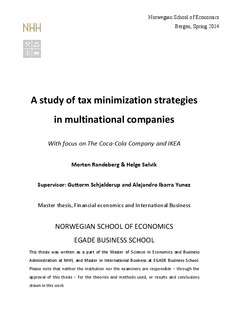A study of tax minimization strategies in multinational companies : with focus on The Coca-Cola company and IKEA
Master thesis
Permanent lenke
http://hdl.handle.net/11250/222482Utgivelsesdato
2014Metadata
Vis full innførselSamlinger
Sammendrag
In this thesis we study how multinational companies are using various strategies in order to
minimize their total tax burden. We use theory and relevant literature to describe some of the
strategies available, and we also confirm that these strategies are in fact being used on a
global scale.
By studying two of the largest companies in the world, respectively The Coca-Cola
Company and IKEA, we are able to see how some of these strategies are used in real life. By
studying these two companies, we find that both show signs indicating an aggressive use of
tax minimization strategies. The lack of transparency and the complicated organizational
structures we have found are both clear indications that aggressive tax planning is being
used. By locating the concentrate operation in a tax haven, we believe that The Coca-Cola
Company is able to keep massive amounts of income outside of the United States, free of
tax. This strategy is possible by having the parent located in Delaware, a high secrecy
jurisdiction known for offering easy access to tax havens. Tax havens and high secrecy
jurisdictions are also common denominators for IKEA´s corporate structure, which includes
both a foundation and holding companies located in tax havens such as the Netherlands, The
Netherlands Antilles and Luxembourg. By funnelling royalty payments through shell
companies and into holding companies in tax havens, as well as shifting profits away from
high tax jurisdictions by using aggressive transfer pricing and internal debt; we believe that
the companies able to save massive amounts of taxes.
The problem of companies being able to avoid taxes is the result of a malfunctioning global
tax system, where various loopholes are easy to exploit. The lack of a common
understanding between all jurisdictions, where some deviate from the others in order to
increase income, is a problem that needs to be solved. As we describe in the last chapter of
our thesis, several actions have been and are to be taken in order to prevent companies from
dodging taxes. Most countries are now on board for a new global transparency agreement,
and there is reason to believe that we will see changes in the near future, hopefully
increasing the total amount of tax paid at a global scale.
